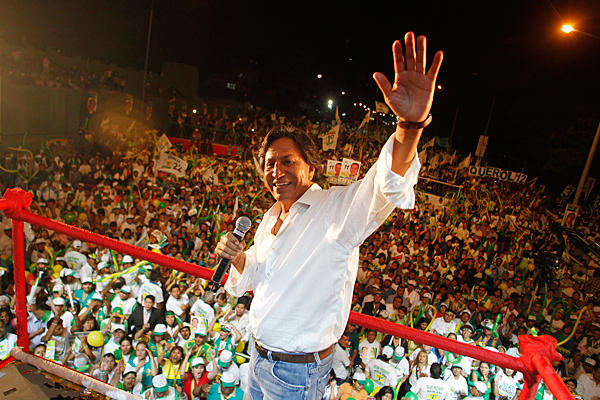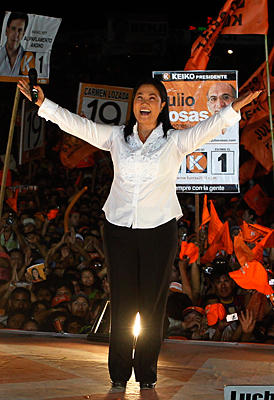
(above) Peru's presidential candidate and former President Alejandro Toledo waves during his closing campaign rally in Lima, Peru, on April 7. Leftist Ollanta Humala is forecast to win in the first round of Peru's tight presidential election on Sunday and face right-winger Keiko Fujimori in a run-off, two new polls showed on Thursday. Photo: (Enrique Castro-Mendivil/Reuters)
The Christian Science Monitor - CSMonitor.com
Peru election: How a president, a criminal, and a Nobel winner are deciding the race
April 8, 2011 - Christian Science Monitor
Imprisoned former President Alberto Fujimori, current President Alan García, and Nobel Prize in Literature recipient Mario Vargas Llosa are replicating, in some ways, their own electoral circus from 20 years ago.
By Lucien Chauvin, Correspondent
Lima, Peru
Mario Vargas Llosa, recipient of the 2010 Nobel Prize in Literature, this week stepped into the fray of Sunday's Peru election and endorsed former President Alejandro Toledo.
He also aimed scathing remarks at the leading presidential candidates, left-wing Ollanta Humala and the right-wing Keiko Fujimori. The latest polls show Mr. Toledo, an economist and former front-runner who served as Peru's first indigenous president from 2001 to 2006, now trailing several points behind Mr. Humala's 29 percent and Ms. Fujimori's 24 percent.
An election between the latter two, Mr. Vargas Llosa said months ago and repeated this week on a local TV station, is "a choice between terminal cancer and AIDS." He also told CNN that the election of either candidate "would truly be a catastrophe for Peru."
 (right) Peru's presidential candidate Keiko Fujimori greets supporters during her closing campaign rally at San Juan de Lurigancho district of Lima, Peru, on April 7. Leftist Ollanta Humala is forecast to win the the first round of Peru's tight presidential election on Sunday and face right-winger Fujimori in a run-off, two new polls showed on Thursday. Photo: Mariana Bazo/Reuters
(right) Peru's presidential candidate Keiko Fujimori greets supporters during her closing campaign rally at San Juan de Lurigancho district of Lima, Peru, on April 7. Leftist Ollanta Humala is forecast to win the the first round of Peru's tight presidential election on Sunday and face right-winger Fujimori in a run-off, two new polls showed on Thursday. Photo: Mariana Bazo/Reuters
Both candidates have avoided retaliating, knowing that Peruvians are proud of Vargas Llosa's Nobel prize, the first ever won by a Peruvian. Attacking him could be detrimental to their electoral health.
The remarks underscore the influence that Vargas Llosa is playing over the election Sunday, when Peruvian voters go to the polls to pick a new president from among 10 candidates. He is among three names influencing the race, maybe even decisively, who are not on the ballot yet have made the race nastier and more volatile than other recent elections.
The three men – former President Alberto Fujimori, current President Alan García, and Vargas Llosa – are replicating, in some ways, their own electoral circus from 20 years ago.
Old grudges relived
In 1990, Mr. García was wrapping up his first term as president. While not running then for reelection, his APRA party produced a famous ad in the 1990 presidential runoff between Mr. Fujimori and Vargas Llosa, using Pink Floyd's "The Wall" to warn voters against an economic disaster if Vargas Llosa won.
García's government had already destroyed the economy – GDP shrank by 14 percent in 1989 and between 1985 and 1990 inflation was above 2 million percent – so the ad helped stoke fear of greater disaster. Fujimori, a political neophyte who emerged in the polls only weeks before the vote, won the race.
Two years later, Fujimori would close Congress and force García into exile. The government collapsed in the late 1990s and Fujimori fled to Japan in 2000, paving the way for García's return and presidential run in 2001, which he narrowly lost.
García finally made a comeback in the 2006 election, but his APRA party only won 36 seats in the 120-member Congress. An alliance was forged with a political bloc still loyal to Fujimori, who by then was wanted in Peru on charges of corruption and human rights abuses.
García also reconciled with Vargas Llosa a few years ago and eventually appointed him to head a museum project that would house exhibits on the 20 years of political violence that shook the country between 1980 and 2000. Vargas Llosa quit the committee last September, after the García government tried to force legislation that would allow crimes against humanity to expire. The legislation was later rescinded, but Vargas Llosa did not return to the committee.
García's participation in the 2011 race has been more subtle, although several moments revealed his desire to meddle, too. Speaking to a group of businesspeople, he said that while he could not chose the next president, he could influence who would not be elected.
"I have done it before," he added, in an apparent reference to the 1990 race.
Fernando Tuesta, a leading pollster in Peru, says García has vastly overestimated his influence. "García has created a myth that he can decide the election, but the APRA vote has already been divided among the candidates and he does not have the capacity to endorse anyone," says Mr. Tuesta.
Humala and Fujimori rally supporters
Humala, the leading candidate in the final stretch, still believes that fraud is possible to keep him from winning. He called on his supporters during his closing rally this week to form "an army of observers" at polling stations to protect their votes from fraud.
Congresswoman Fujimori, meanwhile, is running on the legacy of her imprisoned father – who remains wildly popular, despite the fact that he was sentenced to a 25-year prison term on April 7, 2009, on human rights charges. He was convicted a few months earlier on corruption charges. Ms. Fujimori has promised to continue where he left off after fleeing one of the largest corruption scandals in South America's recent history.
The elder Fujimori is held in a special police prison where he receives visitors – more than 100 on some days – and has played a backroom role in the campaign, even though this has been weakly denied. His personal nurse is running for Congress. Many of his former ministers are also running.
To some critics, it seems the only former government officials not running in the election are those in prison, recently released from prison, or still under criminal investigation.
"Keiko is nothing. She is only standing in the election because her father cannot," says Miguel Sanchez, a university student attending a rally marking the 19th anniversary on April 5 of the former president's decision to close Congress and rule by decree. "We have to say 'no' to a puppet government."